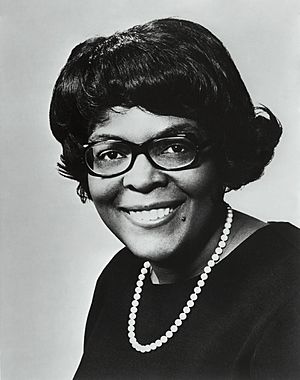Cardiss Collins facts for kids
Quick facts for kids
Cardiss Collins
|
|
|---|---|
 |
|
| Member of the U.S. House of Representatives from Illinois's 7th district |
|
| In office June 5, 1973 – January 3, 1997 |
|
| Preceded by | Frank Annunzio |
| Succeeded by | Danny Davis |
| Personal details | |
| Born |
Cardiss Hortense Robertson
September 24, 1931 St. Louis, Missouri, U.S. |
| Died | February 3, 2013 (aged 81) Alexandria, Virginia, U.S. |
| Resting place | Arlington National Cemetery |
| Political party | Democratic |
| Spouse | |
| Education | Northwestern University |
Cardiss Hortense Collins (born Robertson; September 24, 1931 – February 3, 2013) was an important American politician from Illinois. She served in the United States House of Representatives from 1973 to 1997. As a member of the Democratic Party, she made history. Cardiss Collins was the fourth African-American woman to serve in Congress. She was also the first African-American woman to represent the Midwest in Congress.
Collins was first elected to Congress in a special election on June 5, 1973. This election was held to replace her husband, George. He had sadly passed away in a plane crash in December 1972. Before becoming a politician, Cardiss Collins worked as an accountant. She held various jobs in the state government.
Contents
Cardiss Collins's Political Journey
Cardiss Collins was a strong voice for women's health and well-being throughout her time in politics. She worked hard to make sure women had the support they needed.
Helping Women's Health
In 1975, Cardiss Collins played a key role in changing rules for Medicare. Medicare is a health insurance program. Before her efforts, Medicare did not cover the cost of breast prostheses after a mastectomy. A mastectomy is a surgery for breast cancer. These items were seen as "cosmetic" or just for looks. Thanks to Collins, Medicare began to cover them, helping many women.
Leading in Congress
In 1979, Cardiss Collins was chosen as the president of the Congressional Black Caucus. This group is made up of African-American members of the U.S. Congress. She used this position to speak out on important issues. She even sometimes disagreed with President Jimmy Carter. Later, she became the vice chairman of the caucus.
During the 1980s, Collins faced challenges from other politicians. She successfully won against Alderman Danny K. Davis twice. Danny Davis later took her place in Congress in 1996. In 1990, Collins joined 15 other African-American women and men. They formed a group called the African-American Women for Reproductive Freedom.
Focusing on Key Issues
In 1991, Collins became the chair of an important committee. It was called the Energy and Commerce Subcommittee on Commerce, Consumer Protection, and Competitiveness. Her main goals in Congress were:
- To create universal health insurance. This would mean everyone has access to health care.
- To ensure gender equity in college sports. This means boys and girls would have equal opportunities.
- To improve federal child care facilities.
In 1993, Collins became well-known across the country. She led a committee that looked into college sports. She was also a critic of the NCAA. The NCAA sets rules for college sports. In her last term (1995–1997), she was a top member of the Government Reform and Oversight Committee.
Later Life and Legacy
Cardiss Collins decided not to run for re-election in 1996. She mentioned her age and the fact that the Republican party had a majority in the House.
In 2004, she was chosen to lead a special group. This group looked at how African Americans were shown in TV ratings. Cardiss Collins passed away on February 3, 2013, in Alexandria, Virginia. She was 81 years old.
A building in Chicago, Illinois is named in her honor. It is the United States Postal Service's Cardiss Collins Processing and Distribution Center. It was finished in 1996. This building is a lasting tribute to her important work.
See also
- List of African-American United States representatives
- Women in the United States House of Representatives

